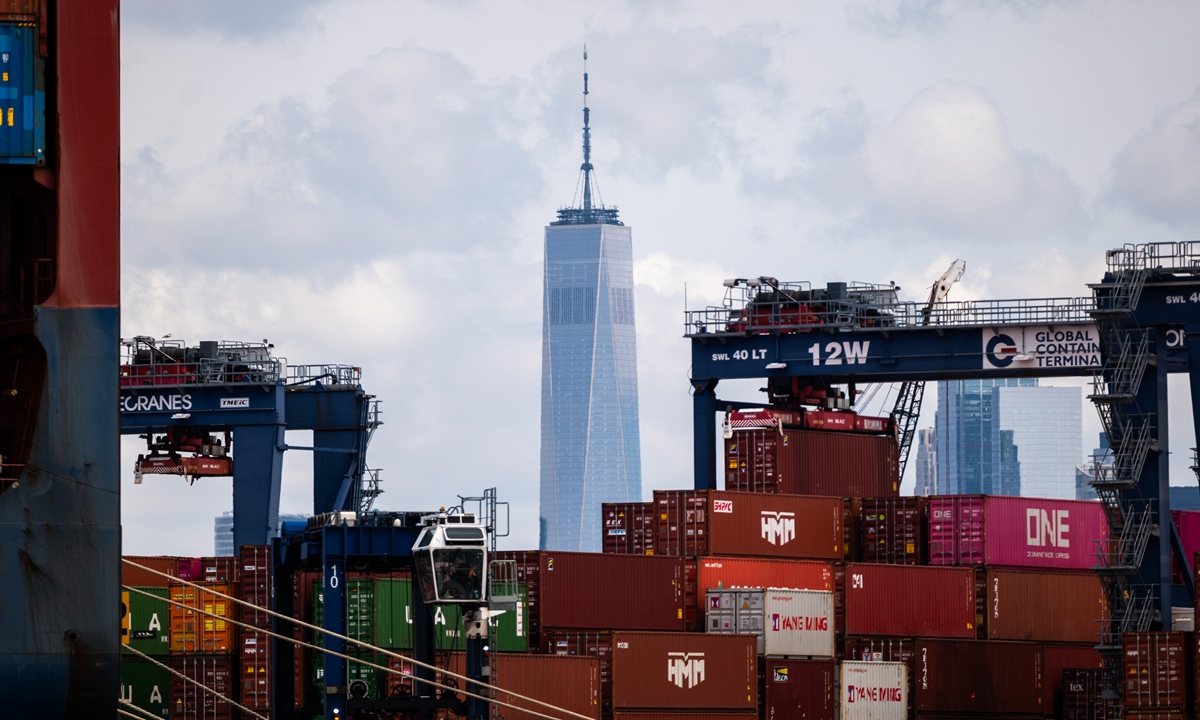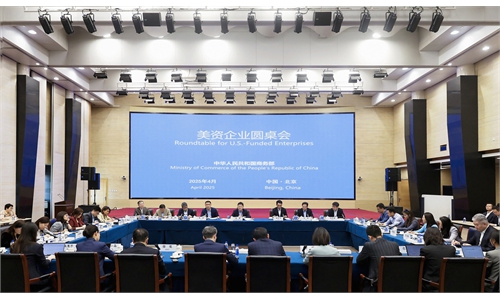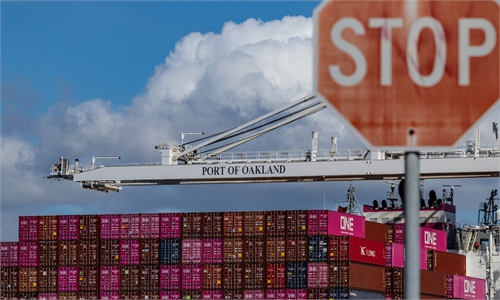US biggest casualty of Washington’s tariffs as the rest of world encouraged to turn away from trade with US

One World Trade Center, or the Freedom Tower, stands in the distance from Port Liberty on April 10, 2025 in Bayonne, New Jersey, the US. Photo: VCG
The US shocked the world by announcing sweeping "reciprocal tariffs" on all trading partners on April 2. However, less than a week later, it announced an immediate 90-day tariff pause for many countries and exclusions for steep reciprocal tariffs to some categories of products including smartphones, computers and some other electronics.
These tariffs are more political theater than serious policy. While Washington claims they will penalize its trade partners, the primary damage will be domestic: They will cause inflation, hurt the US economy and its most powerful corporations, and they will even erode, rather than bolster the US dollar's world role. Above all, they will further undermine the position of the US as an international actor, as unreliable and untrustworthy. Overall, Washington's actions are poised to harm the US itself.
There is the separate question of the US government's administrative capacity to implement these tariffs. It requires some immensely complicated calculations on the part of US officials and would require, if they are to be implemented, a vast customs bureaucracy which the US simply does not have at the moment and is unlikely to be able to create at short notice.
Radhika Desai Photo: Courtesy of Radhika Desai
Protectionism in disguise
Washington labels the latest measures "reciprocal tariffs." The idea is to frame them under the legitimacy of the 1933 Reciprocal Trade Agreements Act under which US Congress permitted then US president Franklin D Roosevelt to negotiate reciprocal tariff reductions that had become urgent, particularly for the US. This act was widely credited with undoing the damage of the Smoot Hawley tariffs of 1930 and certainly, the reciprocity of those tariffs was genuine.
What the current US administration announced on April 2 was anything but reciprocal. Though the announced aim had been to restore "fairness in US trade relationships" by creating a measure of the unfairness inflicted on the US in various ways, including through non-tariff barriers and currency values, and though US officials issued a complex looking formula with some Greek letters, in reality, the formula was bizarre in the extreme. The US simply took each bilateral trade deficit with a country and divided it by that country's total exports to the US to arrive at an alleged "index" of that country's trade unfairness to the US.
Then this index was "magnanimously", or in the US President's words, "kindly" divided by half and that was the tariff imposed. The result was macabre. Tariffs were not only imposed on islands with only penguins for inhabitants, desolate whaling stations and even a US air force base, countries like Cambodia, which export a certain amount to the US but cannot import much and had therefore ended up with a high index of "unfairness" according to the formula adopted by US officials, were slapped with tariffs of 49 percent and more while certain rich countries got away with only the "baseline" 10 percent tariffs which were imposed even on countries with whom the US has a trade surplus.
Needless to say, all these trade measures announced by the current US administration violate WTO rules.
Multipolar trading system
Many fear that these tariffs will lead to a breakdown of the international trading system. However, I tend to think otherwise. The US is the principal malcontent, largely because it failed to establish an imperial world system in which it can live off the tribute of the rest of the world and, instead, ended up de-industrializing itself in the process. To be sure, it is a big malcontent. However, in today's multipolar world, practically every other country has the ability and the desire to act better.
There may have been a brief decade or two after World War II when the US economy was so big that any disruption on its part could cause worldwide reverberations. Those days are however long gone. Today the US accounts for a mere 15.9 percent of world imports. Apart from particularly vulnerable economies like Canada and Mexico, which deepened their trade relations with the declining US, most countries can manage without the US as a major or substantial trading partner. So, overall the result of Washington's moves will be to harm the US itself.
But whether these tariffs harm or intimidate trade partners or whether they are eventually revoked, the US administration's recent erratic tariff policy has already undermined confidence in the US as a trading partner. It has forced most affected countries, including vulnerable ones such as Canada and Mexico, to explore their alternatives to trading with the US.
The biggest casualty of the US administration's tariff policies is the US itself.
As the rest of the world seeks alternatives to trading with the US, China will emerge the winner. China has stronger trade appeal, greater productive investment capacities, increasingly and impressively superior technological capabilities, and a far greater range of goods and services for import and export of excellent quality and price. In this context, the US risks being left out.
The author is a professor at Department of Political Studies of University of Manitoba, Canada and a Visiting Professor at the Department of International Development of the London School of Economics and Political Science.



